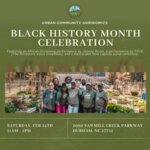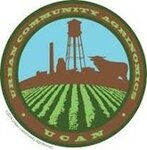

On January 12, 2024, ownership of the 176-acre Catawba Trail Farm was formally transferred to Urban Community AgriNomics (UCAN) from Triangle Land Conservancy (TLC), a land trust based in Durham, North Carolina. One of the region’s largest transfers of property from a land trust to an African American-led nonprofit, the deal serves as a model for a growing conservation movement to redistribute land to Black institutions and individuals.
“For 245 years this property was known as Snow Hill Plantation, Now, we are proud to officially update the records and hand over the 176-acre Catawba Trail Farm to Urban Community AgriNomics,” said Sandy Sweitzer, Executive Director of Triangle Land Conservancy. Sweitzer presented the formal deed to Sellars at a special ceremony on Dr. Martin Luther King, Jr. Day at Catawba Trail Farm.
“Imagine waking up to find that your greatest dream has come true. That's what ownership of the Catawba Trail Farm means to me and UCAN,” said Delphine Sellars, Executive Director of UCAN. “TLC gave us what we initially asked for, access to property to help build resilience among the residents of Durham County, and now they have granted us our ultimate wish, land ownership. On this glorious day we give honor to our ancestors who labored without choice on this land and to the many volunteers and supporters for investing and believing in the vision and mission of this small minority organization. As my loving mother would say, To God Be The Glory!”
In 2008, TLC bought the land from a developer because of the vibrant wildlife habitat it provides and its proximity to Little River, which feeds into Falls Lake and provides drinking water to the City of Raleigh.
William Johnston — whose grave site in the woods is one of Durham County’s oldest-known resting places — acquired the land in 1763. His partner, Richard Bennehan, later amassed money to purchase more land and more enslaved people to cultivate it. Bennehan left the property to his son Thomas, and his son-in-law, Duncan Cameron, both of whom willed most of the property to Duncan’s son, Paul.
By the 1860s, the younger Cameron and his siblings owned some thirty thousand acres in central North Carolina crossing five modern counties. The Cameron family was also the largest slaveowning family in the state, at one point they had almost 1,000 enslaved people working their land.
In recent years, citizens have successfully advocated to rename districts and buildings named after the Camerons. While this is important, these actions do not change the sobering fact that of all private U.S. agricultural land, White people account for 96 percent of the owners, 97 percent of the value, and 98 percent of the acres. (Source: Rural America report on land ownership by race/ethnicity).
To address these gross inequities, Triangle Land Conservancy created the Good Ground Initiative (GGI) to conserve more farmland and increase landownership opportunities for historically underserved land seekers.
The GGI program turns organizational resources and power into equitable land distribution by leveraging TLC’s expertise and that of partners, such as the Rural Advancement Foundation International, the Croatan Institute, and Black Family Land Trust. The initiative opens pathways for historically underserved land seekers to own land without having to compete with development pressures and prices.
The transfer of Catawba Trail Farm to UCAN represents TLC’s first Good Ground project. It was a long and complicated process. Sweitzer reflected on the challenges:
“TLC is not the first to try such redistribution, but deals that make land available to Black-led nonprofits aren’t common and systemic racism doesn’t make it easy,” said Sweitzer. “We received grants from Raleigh’s Watershed Protection Program and the North Carolina Land and Water Fund to purchase the Catawba Trail Farm property, which came with restrictions.”
“One of the most significant hurdles we had to overcome was that despite UCAN using only a small portion of the property, TLC could not legally sell or give UCAN just that portion,” said
Sweitzer. “UCAN would need to take ownership and stewardship responsibility of all 176 acres.”
In 2016, TLC offered UCAN use of an abandoned farm. While others saw dilapidated buildings, overgrown fields, and massive fallen trees, Delphine imagined a farm where people could raise their own food and she could create a community to teach new and future farmers.
After a year of negotiations, in November 2017, UCAN finalized a User License Agreement with TLC for the use of the property. This allowed Delphine and volunteers to begin an urban garden project that started with hours spent clearing brush and debris, and stabilizing farm structures. Over time they also embraced the forest with trails and nature education partnerships.
“I thought there would be a few raised beds,” recalls Sweitzer. “I had no idea UCAN would transform the land the way they did. And I could not be more impressed. As the years went on, it became clear to us that the seeds UCAN was planting on this land were growing more than food or even community, and soon their vision and connection to the land had outgrown our original arrangement. “
By Spring of 2018, UCAN began to reclaim the dilapidated historic farmstead into Catawba Trail Farm (CTF) and Community Garden. Volunteers cleared a densely wooded pasture and constructed a 10’ fence around the perimeter of a 47 raised bed garden. By the end of 2019, UCAN members, volunteers and supporters enclosed an additional ¾ acre that included a small orchard, in-ground planting area and chicken coop.
“It became clear that the best way for the property to provide the community with all four of the benefits of conservation, including supporting local farms and food and connecting people to nature, was for TLC to prevent future development with conservation easements and then step aside so that Urban Community AgriNomics could put the land to work for their mission,” said Sweitzer.
During UCAN’s annual MLK Day of Service honoring Dr. Martin Luther King Jr., volunteers from throughout the Triangle helped spread mulch, plant bulbs, and remove old siding from one of the historic structures on the property. Throughout the day of service, visitors were able to walk along paths that were once part of the 510 miles of interconnected Native American trading paths through the Piedmont.
Current and historic photos from Catawba Trail Farm are available along with a detailed FAQ. Contact Cara Lewis at clewis@triangleland.org.
Triangle Land Conservancy (TLC) strives to create a healthier and more vibrant Triangle region by safeguarding clean water, protecting natural habitats, supporting local farms and food, and connecting people with nature through land protection and stewardship, catalyzing community action and collaboration. Learn more at www.triangleland.org.
Catawba Trail Farm is owned and managed by Urban Community AgriNomics, a nonprofit based in Durham, North Carolina. UCAN works with low-income communities and local schools to teach healthy food preparation and preservation and life skills that encourage academic and career success. UCAN also distributes fresh food to those in need. Learn more at www.ucan.today.
Comments
No comments on this item Please log in to comment by clicking here